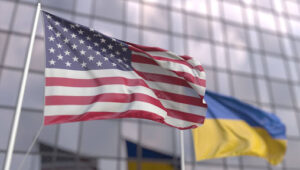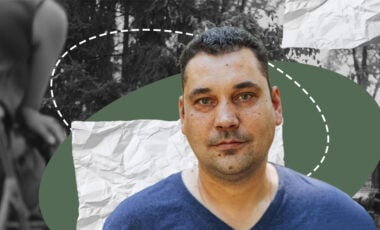Putin's quest for allies and attention: What closer ties between Russia and North Korea mean for Ukraine

Russian President Vladimir Putin recently visited the Democratic People's Republic of Korea. He secured "full support" for the war in Ukraine, and North Korea promised to strengthen strategic ties with Russia. After that, Putin traveled to Vietnam, signing a dozen trade agreements with local leaders. He also brought some material gifts from the trips, like a portrait tombstone and a bust from the North Koreans, and a portrait made using Vietnamese light and the shadow of a horse and birch tree.
The deep symbolism of these gifts may be apparent to those well-versed in the cultures of that part of the world. Others might interpret these presents literally as Asian wisdom, saying, "A toad wants to eat the meat of a swan" — someone tries to bite off more than they can chew. This proverb could describe the outcomes of those trips. However, this assessment would only make sense if Russia and Ukraine were separated by an ocean, were not at war, and were not drifting further apart like ripples on water.
The leaders of two dictatorships — Russia and North Korea — signed a comprehensive strategic partnership agreement. Specifically, the document includes mutual military assistance in case of aggression against Pyongyang or Moscow — a sort of two-party Article 5 of the North Atlantic Treaty. Kim Jong-un described the signing as starting a "new, highly prosperous" period. Putin's aide, Yuri Ushakov, called it "an evolution of the geopolitical situation in the world and the region." The Russian official also said the agreement was "not aimed against specific countries, but at ensuring stability in the northeastern region of Asia." Knowing the Russian penchant for mocking George Orwell, we should understand his statement the other way around — Russia plans to be friends precisely against certain countries and destabilize Asia.
Russia's attempt to build a strategic defensive (or offensive) alliance with the Kim regime is evident. Meanwhile, the difference between supplying shells and being ready to fight on an "ally's" side is enormous. Who better to know this than Ukraine? In this matter, we need to separate real danger from a sham and Russia's desires from North Korea's actual capabilities.
A military terra incognita
It turns out we know relatively little about North Korea. Our knowledge about it is woven from stereotypes and memes: banned internet, food shortages, people eating grass, overpowering propaganda, a football team winning the World Cup, and so on. On the other hand, there are plenty of photos and videos showing the militarism of this country and its people worshipping the ruling dynasty.
The isolation from Western and South Korean cultural influences is also the regime's initiative, manifested in criminal prosecution, with subsequent execution, of young people for watching TV dramas and listening to songs. Content comes from the "cloud" — South Koreans send balloons with flash drives, and they get garbage and excrement in return. Meanwhile, North Korean hackers are considered a serious threat. How is that possible in a country without universal internet access? Perhaps the same way Ukraine, without a navy, is crushing the Russian Black Sea Fleet.
Several factors guided the meeting in Pyongyang:
- Both countries are in isolation to a different extent, making the search for allies and resources a top priority for them.
- Just before the anniversary of the Wagner mutiny, Putin went looking for an answer to mercenary leader Prigozhin's now-legendary question to former Russian minister Shoigu — "Where is the f*cking ammunition?" Recent reshuffles in the Russian Ministry of Murder, accommodating elite relatives of the leader and his friends, showed that the newly elected defense minister, Andrey Belousov, would not look for ammunition either. The supreme commander Putin had to do it himself. Meanwhile, his counterpart in North Korea had stocks of shells but needed satellite launch technology and improvements to his weapons of mass destruction. A mutually beneficial barter suggests itself.
- The bonus of this exchange will be pressure on the US, Europe, Japan, and the rest of the "hostile" world to disperse their resources and reduce their support for Ukraine or Taiwan.
- Finally, the signed partnership is a kind of rehearsal before forming a broader alliance involving China, Iran, and their numerous proxies. If they become stronger after signing a treaty and the response to their union remains purely verbal, then a better invitation for aggression couldn't be invented. The almost continuous election period throughout Europe, ending with the prize in the United States seems like the most favorable opportunity for establishing alternative "diplomacy."
From Russia, with love
According to the American global security organization C4ADS, from August 2023 to January 2024, North Korea supplied Russia with about 1.6 million artillery shells. South Korea estimates that North Korea sent almost 5 million shells to Russia. Although the numbers vary, even the lower estimate exceeds the supplies the Ukrainian Armed Forces received from Western partners during the same period. In late 2023, North Korea also gave Russia some ballistic missiles and launchers. Clearly, by allying with this vast stockpile of Soviet-era weaponry and its copies, Putin not only aims to raise the stakes but also expand the scale.
North Korea has several thousand tanks, over 2,000 armored personnel carriers, and over 20,000 artillery systems. This arsenal, along with spare parts and barrels, is of interest to Putin, but it's unclear how much Kim is willing to share. Strategic partnerships imply reciprocity, and we don't know whether the Kremlin is ready to boost North Korea's aviation capabilities and air defense with modern weapons — areas where North Koreans are significantly lagging but which Russia also needs to develop. It's doubtful that Pyongyang will be satisfied with "future promises" with an indefinite fulfillment period. The situation with long-range missiles is similarly ambiguous — North Korea regularly scares neighboring seas with its "Hwasongs." It could also have accumulated an arsenal of several dozen nuclear warheads even without a strategic partnership with Russia.
All this doesn't mean North Korea only needs money and food from Russia. North Korea's military-industrial products are made using designs taken from the USSR, China, Russia, and elsewhere. Its entire military "zoo" may look menacing in reports and tables, but in practice, its missiles often don't reach their targets, and shells burst the barrels of cannons. Russian military correspondents complain that the "special military operation did not achieve its goals" due to the changing technological landscape of warfare. North Korean army leaders are likely aware of the need for modernization.
The mentioned technology exchange — Russia gives North Korea modern, expensive, and unique items, receiving in return old, cheap, and mass-produced ones — could strengthen both signatories and cause concern in Japan, South Korea, and the USA. Russia has already shown its hand, and behind North Korea's absurd antics lies a consistent strategy of overwhelming the region's missile defense systems. The benefit for Russia is also evident—the greater the threat posed by North Korean missiles, the more their opponents will cling to their air defense systems rather than sending them to Ukraine.
A report from a South Korean TV channel added fuel to the fire by announcing that in July, engineering units from the North Korean army arrived to "restore and rebuild the [Russian-occupied] Donetsk region." This "deployment" (or its announcement) has been the most tangible result of the agreement so far. It's a Russian-Korean response to the Berlin conference on Ukraine's reconstruction—while you're just planning to rebuild Ukraine, we've already moved from empty talk to action.
Rebuilding a destroyed region with North Korean labor and Russian money suits Ukrainian interests. However, this maneuver couldn't be more unclearer. Why spend on rebuilding something that will either be destroyed again, return to Ukrainian control, or stand in ruins as a warning? Such nobility doesn't suit the bloodthirsty Russians, and such a miscalculation isn't typical for their leaders. The Koreans will more likely be used for fortification work and building other military facilities, but Russian engineering units can handle that themselves. Whatever it means, reports indicate that North Korea has provided workers at seven large ammunition factories with food rations for eight months. Are engineers supposed to be fed by the partner? Or are they just incidental in this story?
The third second front…
It's not just Ukraine that's struggling—Russia also can't manage this war alone. Despite paying its fighters $20,000, propagandist stories about the omnipotence of its defense industry and its countless tanks, nuclear weapons, and endless resources, Russia is scouring the globe for ammunition. The need is urgent for two reasons. First, the Russian method of warfare—"carpet artillery bombing over areas"—is extremely costly. Second, the Czech ammunition initiative providing Ukraine with ammunition and the West's increased activity have reduced the gap between the Ukrainian Armed Forces and their barbaric opponents in the number of shells fired from sevenfold to threefold. Over the past two years, Russia first emptied Belarusian arsenals, then started importing Iranian ammunition by plane and ship, and now it's North Korea's turn. However, Kim's value is not limited to his stockpiles.
North Korea has a reputation as a terrorist due to its persistent search for and illegal testing of weapons of mass destruction. It constantly tests the stress resilience of South Korea and Japan. Right after Putin's visit, it launched a missile toward Japan and called on everyone in Asia to form an anti-American front. Paying someone for a job they're willing to do for free isn't a great plan, but Putin has no other choice.
The Pentagon called the deepening cooperation between Russia and North Korea something that should concern everyone interested in maintaining peace and stability on the Korean Peninsula and supporting the people of Ukraine. At the same time, Washington voiced a few statements about "China's disappointment with its two neighbors," which could create opportunities for Sino-American relations "for the sake of stability on the Korean Peninsula."
This scenario seems overly optimistic, considering China's interest in the opposite. It doesn't need a strong South Korea as a US ally in the region, so some minor "activity" by Kim Jong-un would be appropriate. However, it should be under Beijing's command, not Moscow's! A separate pact between Russia and North Korea excludes China's directive control. On the other hand, on June 28, the Chinese ambassador to North Korea expressed hope for "strengthening exchanges with the Russian embassy and making a positive contribution to the development of Sino-Russian relations and the Russian relations with North Korea." This statement doesn't sound like a final Chinese warning.
There's a theory that China could be the biggest winner of the war in Ukraine: Russia's invasion of Ukraine allowed Xi Jinping to create problems for the West and make Moscow dependent on Beijing. From this perspective, Putin might want to break the cycle and demonstrate his subjectivity. However, this is a system of equations with two unknowns. If Russia leads a game behind China's back, China's reaction could destroy all plans: Russia's dependence on China can be debated, but North Korea is wholly made in China. If China benefits from the war in Ukraine, then the involvement of North Korean arsenals/engineers/infantry is logical. Despite all the hybrid excuses, a conspiracy that won't stay hidden for long is worth discussing. We also can't dismiss the typical Russian approach — things aren't always as they seem.
Russian bluff with an Asian tint
In such situations, maintaining an appearance of seriousness is crucial: events unfold behind closed doors and in silence, with the parties later telling the public and the press what they agreed upon without overburdening them with details. In this case, everything was so showy that it felt embarrassing for the old-fashioned dictatorships, which seemed to be playing at democracy and openness. The negotiations between Russian and North Korea lasted for 11 hours, as if real debates were taking place. For the newly minted partners, documenting this partnership isn't as important — it has been going on for a long time without grandiose documents — as the showy coverage of the possibility of concluding it.
Two sanctioned countries ceremoniously sign a military cooperation agreement, even though one has already attacked its neighbor and the other has long and consistently threatened several others. What is this, if not a signal to the West? We are not afraid of you and are uniting our efforts in boldness. The signing also seems like a show to other interested actors—North Korea demands recognition of its strength and significance since even Russia acknowledges it; the Kremlin confirms that the cause of countering "imperialists" is alive and thriving, and anyone with shells can openly join it. A message has been sent to Russian society—Russia has friends and allies. It's no coincidence that the Public Opinion Foundation calls Putin's trip one of the week's leading events for 13% of Russians—only "the special military operation" ranks higher (19%), while only 5% are concerned about natural disasters in their country.
The axis of evil activating may push our partners to more decisive actions. South Korea, in particular, possesses a powerful arsenal of modern weapons. If, despite Seoul's caution, the Kremlin does indeed send more advanced missile technologies to Pyongyang, the Ukrainian Armed Forces could receive something more interesting than non-lethal aid from South Korea. However, Seoul might take a long time to decide on direct supplies of its military equipment and ammunition to Ukraine, and we shouldn't get our hopes up too much. Instead, the increased sanctions pressure on Moscow came almost immediately. South Korea added 243 items to the list of goods banned from being imported into Russia and Belarus. As it turned out, by gifting Kim Jong-un an "Aurus" car with South Korean parts, Putin closed his country's access to optical devices and metalworking machines.
The world responded appropriately. For some, the mere fact of Russia turning to SUCH an ally is a sign of Putin's helplessness and desperation. For others, it is a successful attempt to sow anxiety, and for "independent journalists" from Bangkok, it was the final proof that the West is to blame for everything and will now reap the storm. There are other views as well, infinitely pessimistic or mockingly sarcastic. This diversity of opinions is precisely what the Kremlin sought to achieve but overdid it a bit.
The Russian delegation undoubtedly brought short-term benefits to their country from Pyongyang. For instance, judging by the photos from open sources, Russians have started using M-46 guns made in the 1950s — the Ukrainian Armed Forces have them too — North Korea could have provided 130-mm ammunition for them. However, as Professor Stephen R. Nagy from the International Christian University puts it, in the 21st century, playing "Russian roulette" will not bring stability or benefit to Russia or any other authoritarian state. It sounds good and promising, but actions must accompany it.





















































